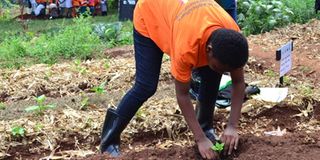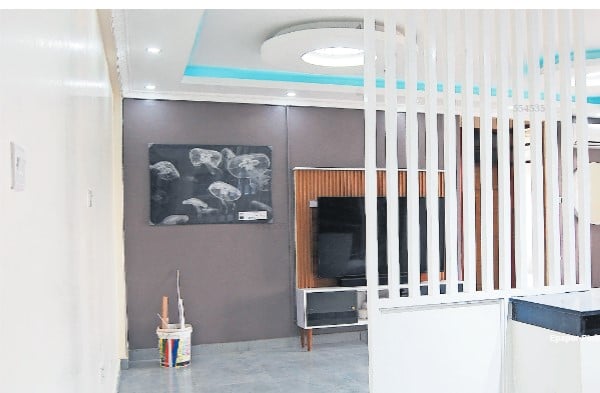Prime
School farm camp awakens students’ interest in farming

A student learning how to plant and mulch vegetables. File photo
The 2015 School Farm Camp, held last month, left students and their teachers excited about different farming practices they learnt. Many left with the pledge to apply the skills at their schools and homes.
The camp, an initiative of Gayaza High School in collaboration with FAO—the UN Food and Agriculture Organisation—aims to equip youths with practical agricultural skills. It attracted more than 300 students, and a total of 50 teachers, from 34 schools across the country.
The nature of activities undertaken during the camp allowed the participants to live a life of an entrepreneurial farmer.
During the camp, teachers were also exposed to practical sessions that many of them were unable to do on their own. The focus for the teachers was to integrate agriculture within the various curriculum areas. The objective is that it is not taught as a stand-alone subject but via different themes.
Empower youth
Ronald Ddungu, the deputy headteacher Gayaza High School, said the concept was designed to enable students and teachers develop an entrepreneurial mind, and motivate them to pass on the knowledge to their communities.
The school’s mathematical banana garden is a case in point of not only integrating different subjects in farming but also a whole school approach to entrepreneurial Agriculture.
Alhaji Jallow, the FAO Country Representative, noted that the school farm camp is an initiative that the UN agency will continue to empower youth with agricultural entrepreneur skills.
“Supporting the youth like these who appreciate agriculture as a business and means of livelihoods is a worthy cause that FAO will continue to be associated with,” he said.
During the event, various school teams presented the new agricultural programmes that they started after the 2014 School Farm Camp.
“The individual stories of what the students have been able to do both as simple extension workers within their communities and as individuals back home are gratifying. To us, this shows that the programme is delivering on its objectives and needs to be sustained,” Ddungu noted.
Moses Baingana, a teacher at Nyakasura School in Fort Portal, together with six students attended the camp. He says that it is an excellent idea. “When we attended the first camp in 2014, we were inspired. When we went back to school, we allocated plots to students to grow crops. We also acquired piglets to start a piggery as well as cows. We allow students to do what they want. We are amazed at the zeal they have,” he explained.
Baingana added that in two years’ time, the school will host the farm camp at Nyakasura.
While the idea started as a Gayaza initiative, the 2015 camp attracted participation from various parts of Uganda.
The organisers are working on the next step to ensure other schools implement the idea of gardening to provide students with a variety of nutritious foods but also allow them to learn. “Our wish is to see regional camps organised; North, East, West and Central. Gayaza can host the national camp,” Ddungu said. “Within the regions, we see more participation and the leading schools will attend the national event.”
Gain knowledge
FAO and Gayaza High School have also been working together in creating opportunities for students to gain skills in agriculture while contributing to enhance their nutrition.
The school benefited from an FAO Telefood Initiative, for the school to acquire production input facilities. Under this, it got a greenhouse for vegetable production and training on greenhouse production.
The school has had five greenhouse production cycles for tomatoes. But, most importantly, students from Gayaza and other schools (primary, secondary and universities) visited and gained knowledge/experiences from the facility.
The piggery unit, which has raised more than 50 pigs, started with eight improved breeds of piglets provided by FAO.
The greenhouse and piggery units respectively continue to provided learning opportunities and contribute to food and nutrition of the students, as well as revenue for the school.




